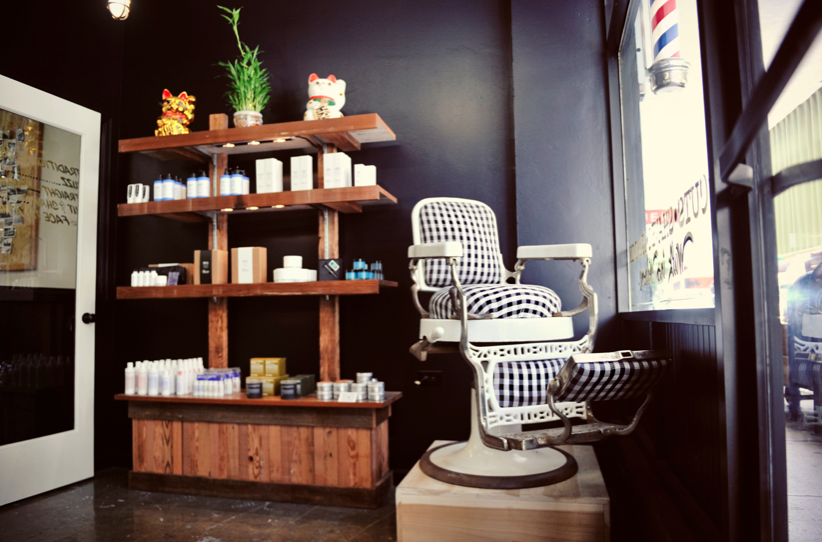
Mojo Barbershop’s Kaliq Rashad.
One of the island’s best barbers, Kaliq Rashad.
Up close, a hair carving resembles a hedge maze of labyrinthine twists neatly trimmed into the scalp. For a better look at how his work is coming along, Kaliq Rashad takes a step back. It’s a Wednesday afternoon at Chinatown’s Mojo Barbershop, and a forest of curves are emerging across the head of his client, who is draped in black and texting in silence on his phone.
Rashad pauses to study a photo of the man’s tattoos, the inspiration for today’s design. He picks up a comb in one hand, an electric razor in the other, and returns to moving the blade across the scalp in short, decisive strokes.
Every once in awhile, he brushes away stray hairs and switches out the current razor with one of many others hanging in a tidy row under his counter. The blades get hot and can burn the skin, he explains. Rashad’s razors are his paintbrushes – some fat for wide lines, some thin for delicate ones – all aiding him in the art of hair carving.
Growing up in a New York neighborhood where being style-savvy was key to survival, Rashad experimented with cutting his own hair in the bathroom mirror. A barber noticed his talent and offered him a chair in his shop. The then-19-year-old Rashad preferred to spend his money on Gucci sneakers over start-up clippers, but he invested the necessary $300, and 22 years later, he maintains the tools of his trade with fastidious care and the respect of an artist.

“I care about cleanliness like I’m a dentist,” Rashad says with a laugh. He unwraps a new blade for each beard shave and ritualistically oils his razors. This professionalism, coupled with his unique skills as a sculptor of hair, has made Rashad the go-to guy for one-of-a-kind looks.
“Hairoglyphics,” Rashad’s Egyptian-inspired brand name for his hair carvings (his mother often wandered through the Egyptian wing of the Metropolitan Museum of Art while pregnant with Rashad), allows him to share the story of each person he works on through images.
Rashad has carved wings for football players seeking spiritual speed. For an ocean lover, he replicated the image of a surfer from a magazine photo. Rashad even sculpted a Transformers Decepticon on the back of a 4-year-old’s head. His creations can take hours to complete, but fade away in the time it takes for hair to grow back. “That’s what keeps me in business,” Rashad teases. “Somebody always needs a haircut.”

Rashad’s temperament reflects the duality of his hard and soft Chinatown environs. As he works, he laughs loudly at his jokes with a kolohe gleam in his eye and sounds boyishly cocky when he shouts, “That’s my jam!” to the song on the shop’s airwaves.
Yet at other times, he leans in, hushed and apologetic for steering our conversation from barbering to topics of spirituality, nature and his mother. He chats happily with clients but cherishes his retreats to the Mojo man cave, a candle-filled nook occupied by a solitary leather chair. “I can be very despondent and antisocial,” he says, looking at his hands.
“Not because I want to be. I can be standoffish, but I’m not being conceited. People ask, ‘Why are you so quiet?’ and I say, ‘I’m thinking!’”
This introspective side reflects Rashad’s belief that above all, a barber should be humble. Although Rashad enjoys a wide following, he finds value not in the numbers of his clientele, but in the depth of each relationship he creates through his art.
He appreciates the physical connection required of working intimately with an individual in a barber’s chair during a time when technology can separate us from other human beings. Remarks Rashad, “I love art and I love people, so barbering is the perfect fit for me.”

